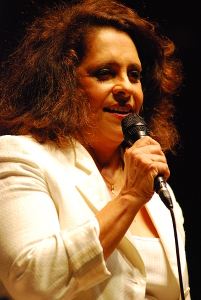| B i o g r a p h y |
 Gal Costa (born Maria da Graça Costa Penna Burgos
on September 26, 1945, in Salvador, Bahia) is a Brazilian singer of
popular music. Gal Costa was born on September 26, 1945, in the city of
Salvador, the state capital of the state of Bahia, Brazil. Her mother,
Mariah Costa Penna (deceased 1993) spent hours listening to classical
music during her pregnancy in hopes that Gal would be interested in
music. Gal's father, Arnaldo Burgos (deceased 1960), died when Gal was
15 years old and the two would never meet. At the age of 10, Gal
befriended sisters, Sandra and Andréia Gadelha, the future spouses of
singer-songwriters Gilberto Gil and Caetano Veloso, respectively. At 14,
she first listened to João Gilberto's "Chega de Saudade" on the radio
and became interested in Bossa Nova. She then went on to work as a clerk
on Salvador's main record store to get closer to music. At 18, she was
introduced to Caetano Veloso by Andréa Gadelha, engaging with him in a
deep friendship that still lasts.
Gal Costa (born Maria da Graça Costa Penna Burgos
on September 26, 1945, in Salvador, Bahia) is a Brazilian singer of
popular music. Gal Costa was born on September 26, 1945, in the city of
Salvador, the state capital of the state of Bahia, Brazil. Her mother,
Mariah Costa Penna (deceased 1993) spent hours listening to classical
music during her pregnancy in hopes that Gal would be interested in
music. Gal's father, Arnaldo Burgos (deceased 1960), died when Gal was
15 years old and the two would never meet. At the age of 10, Gal
befriended sisters, Sandra and Andréia Gadelha, the future spouses of
singer-songwriters Gilberto Gil and Caetano Veloso, respectively. At 14,
she first listened to João Gilberto's "Chega de Saudade" on the radio
and became interested in Bossa Nova. She then went on to work as a clerk
on Salvador's main record store to get closer to music. At 18, she was
introduced to Caetano Veloso by Andréa Gadelha, engaging with him in a
deep friendship that still lasts.
Career
Costa debuted her professional career on the night of August 22, 1964 on
the concert Nós, por exemplo (We, For Example), where she performed
alongside Veloso, Gil, Maria Bethânia and Tom Zé, among others. The
concert inaugurated the Vila Velha Theatre in her hometown. During the
same year, she also performed in Nova Bossa Velha, Velha Bossa Nova (New
Old Wave, Old New Wave), at the same place and with the same singing
partners. She then left Salvador to live in the house of her cousin
Nívea in Rio de Janeiro, following in the footsteps of Bethânia, whose
concert Opinião (Opinion) had become a huge hit on the town. Costa's
first professional recording happened on Bethânia's debut album,
released in 1965. It was the duet "Sol Negro" (Black Sun) written by
Bethânia's brother, Caetano Veloso. She then released her first singles
through RCA Records, "Eu vim da Bahia", written by Gil, and "Sim, foi
você", written by Veloso. On the following year, Costa met Gilberto
personally and participated on TV Rio's 1st International Music Festival
performing "Minha Senhora", written by Gil and Torquato Neto. It failed
to captivate the Festival's audience.
Costa's first album Domingo was released on 1967 through Philips
Records. It was also Veloso's debut. Costa stayed on the label, which
later became Polygram, until 1983. One song released from this album,
"Coração Vagabundo", became a huge hit. On the same year, Costa also
performed two songs on the 2nd International Music Festival, which was
then hosted by Rede Globo. They were "Bom Dia", written by Gil and Nana
Caymmi and "Dadá Maria", written by Renato Teixeira. The latter was
performed with Sílvio César at the Festival and with Teixeira on the
recording. In 1968, Costa became a part of the Tropicalismo movement.
She recorded four songs on Tropicália: ou Panis et Circenses. They were
"Mamãe coragem", written by Veloso and Torquato Neto, "Parque
industrial", by Tom Zé, "Enquanto seu lobo não vem", by Veloso, and
"Baby", also by Veloso. The latter became Costa's first nationwide solo
hit, becoming a classic of Brazilian popular music. On the same year,
she participated in the 3rd International Music Festival, performing
"Gabriela Mais Bela", written by Roberto and Erasmo Carlos. In November,
she participated on Rede Record's 4th Music Festival, performing the
song "Divino Maravilhoso", by Gil and Veloso. The song also became a
nationwide hit and a classic song of popular music.
On 1969, Costa released her eponymous solo debut album, which included
"Baby" and "Divino Maravilhoso". The album is considered a Tropicalismo
classic, balanced between Brazilian stylizations and North American
psychedelic influences. It also featured Costa's third and fourth solo
hits, Jorge Ben Jor's "Que pena (Ele já não gosta mais de mim)" and
Veloso's "Não identificado", respectively. On the same year, she
recorded her second solo album, titled Gal, and featuring the hits "Meu
nome é Gal", by Roberto and Erasmo Carlos, and "Cinema Olympia", by
Veloso. The album served as the basis for the repertoire of the concert
Gal!. Her next album, Legal, was not as far from the mainstream as its
predecessor, and a live album the following year again balanced smooth
Brazilian sounds with heavy rock. In 1973, the cover of Costa's album
Índia was censored — it focuses on her camel toe red bikini bottom.
Costa has recorded songs composed by a number of Brazil's most popular
songwriters such as Tom Jobim, Ben and Erasmo Carlos. In 1982 the single
"Festa Do Interior" from the double album Fantasia became her biggest
ever hit, going multi-platinum by the end of the year. Costa appeared in
the 1995 film The Mandarin (O Mandarim) as the singer Carmen Miranda.
She has recorded songs in Portuguese, Spanish and English.